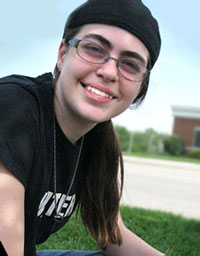“I love to write. What should I study in college?”
Guest Interview with Erynn Besse
Many young writers wrestle with whether or not to study creative writing (or professional writing, or English literature, etc.,) at a college level. We asked Erynn Besse, winner of our 2013 Novel Contest, to tell us about her college choices. Erynn is a gifted writer, deeply invested in her craft, but also passionate about other fields of study.
On choosing a major and the uses of tardigrades:
 Erynn, you are not an English major. Is this something that surprises people?
Erynn, you are not an English major. Is this something that surprises people?
Yes! Last fall, a new acquaintance asked me what I’d be doing over Christmas break.
“Oh, I’ll be in Kansas for a writing workshop.”
She replied: “Oh, cool, so you’re an English major!” Well, no, I’m not. I’m studying for a BA that combines the Chinese language with a business administration degree.
Tell us a little bit about your college search. Was it straightforward?
I don’t think I could ever classify the college search as straightforward. However, I had it perhaps easier than some. I applied to several schools. I applied to one school specifically because they had the oldest and one of the best creative writing programs in the United States. Had I chosen yet a different school, I would have likely been an English and pre-law double major. I waffled between these two schools. They had interesting programs but subpar foreign language classes. A third school had a great Chinese program but really wasn’t a top-choice school. As the decision deadline drew closer, it became clearer to me that I desperately wanted to study Chinese. Here I am. At what was once my third-choice school. And I could not be more grateful for that decision.
What would you say to other young writers who are strongly considering majoring in English?
For the average high school writer, my drive to study something completely separate from English may not be a point of conflict. Do you love writing?—No, not just love it. Do you live and breathe your words? Do you dream of doing nothing but study the written word and craft stories and characters and worlds? If so, study English! I’ve had the pleasure of getting to know many English majors. They’ve gone on to do a wide variety of things—everything from working in human relations, to studying in seminary or law school, to writing for a living.
Have you yourself found English classes helpful?
English classes have taught me so much. A creative writing class honed my ability to write short stories and flash fiction. It pushed me to be more open to writing about myself and focus less on prescribed emotion and fantasy exploration.
I love the Asminovs and the MacDonalds and the Sandersons and the Cards: all fantastic authors that you likely won’t hear too much about in a classical intro-level English class. As much as I love reading and writing, the seeming obsession English departments have with classic literature made me want to dig my eyes out with a spoon. Be that as it may, the college-level English class that focused on seminal American classics helped me understand why classic literature is so loved. That class taught me to appreciate a genre of English I had previously despised.
Yes, English classes will be helpful in the furthering of your knowledge. You will read until your eyes are sore and write until your fingers want to fall off. You will love some of the pieces you read and hate others. Your writing will be torn apart, and, when you come out on the other side of the degree, you will have learned so much more than what you once expected to.
What would you say to teen writers who aren’t sure whether to go to college at all?
Classrooms and writing communities can offer so much to the aspiring writer. If you are serious about writing but not sure about pursuing a college degree, take a few journalism classes at a local college or some online courses. Identify an area of English that you may not know well and find a course in that area. Maybe the course will disappoint, but I’ve found it actually more likely that courses such as these can change your entire perspective on writing.
While I certainly understand the decision to not attend college, I advocate strongly for any aspiring writer to pursue a degree, be it in English or another field.
How has choosing to study something besides English impacted your writing?
Some people assume that I no longer write because it’s not a central focus at this point in my life. I may not be called to be an English major, but in no way does that mean I have stopped writing. In fact, I believe my personal style of writing has been enriched by the study of things typically outside the realm of English.
While an English degree will drastically affect your style, I’ve found that my non-English classes have had a huge effect on which topics I choose to pursue. Right now I am writing a language-centric novel comparing and contrasting different cultures as they interact for trade purposes. You might imagine the conversations I get to have when people ask me what I do for fun. Also consider how vital an impact my chosen field of study has had on the development of this particular idea. Without the lessons on comparing cultures, in-depth language studies, and trade principles, this novel would not have much backbone.
What is your perspective on the general requirements you have to take?
Oh, I love them! I have had the great joy of studying at a liberal arts college. Yes, that means a lot of general educations requirements. Many people despise them, but I’ve found them to be the blood and life force of my writing.
Granted, introductory classes may not be the most fun, but there is always a way to find something that works for you. If you struggle with math, don’t take the Calc 1 class for the mathematically minded; instead, look at a math appreciation class about the Fibonacci Series or how sine and cosine functions control musical theory. If you are not a scienc-y person, look at all the interesting things Bio 101 has to teach you. If you need a second science credit, maybe take a class on animal functions.
Did you know that there’s a creature, a tardigarde, capable of surviving nearly at absolute zero degrees, live in the vacuum of space, and go for ten years without food? I learned about the tardigrade thanks to a gen-ed requirement, and just think about the application for story ideas! And that is just one example of the many fantastic things I’ve learned.
Gen-eds give you the opportunity to explore so many things outside your major. Sometimes these things are so outside of your frame of reference you’ll find your whole life turned inside out and playing a game of cricket with the answer to a problem in the story you’ve been fighting with since ninth grade!
Never say no to the opportunity to learn something new. You never know what interesting place that will take you.
If you could say one thing to your fellow writers facing college choices, what would it be?
If you are in any stage of the college application process or are attending college but still questioning your major, let me just say this: the only way for you to hurt your writing is to do something that you do not truly love. Go study your passion and the words will follow.
Thank you, Erynn. We’re looking forward to following your creative journey!
…
Have YOU invested in something that seemed unrelated to creative writing that ended up enriching your stories? Please share in a comment!
…
 Erynn Besse is a long-time student with The One Year Adventure Novel. Ever since learning how to read, she has been inseparable from books in any and all forms.
Erynn Besse is a long-time student with The One Year Adventure Novel. Ever since learning how to read, she has been inseparable from books in any and all forms.
In 2013, her novel Blue Sky Burnt won The One Year Adventure Novel‘s novel contest. The story assessed the effect of a severe mental disorder through a unique perspective. The novel is Erynn’s attempt to capture her passion for fostering understanding about the misunderstood—part of her drive to communicate stories about topics that ask and answer harsh questions.



I DID major in Writing. (I need someone to set deadlines for me!!) But I agree with your thoughts on this topic! I’ve found that I really need to keep my curiosity about “non-writing” subjects alive. The more questions I ask about the world around me, the more I see to write about. It pushes me to ask questions in my writing as well.
When I took an AP English Lit class in 10th grade, I realized that I was probably not cut out for getting an English degree, as I had always assumed I wanted before.
I’m really glad that I realized that as early as I did. Figuring out what to study in college is difficult enough as it is–having the idea that I needed an English degree still hanging over me wouldn’t have helped!
Because of that, I feel comfortable pursuing other interests in a Politics, Philosophy, and Economics degree–or, if I have to transfer, a History degree. I have many interests beyond writing, and those interests all get into my writing anyway. I’ve written historical fiction (which is one of the reasons I became so enamored with history), with obvious degree connections, and dystopia, where ideas about PP&E can be very relevant. History actually inspires me to write like few other things do.
Novels are about the world and the people in it. Degrees are about different aspects of the world and the way they affect people. I see no fault in studying the world to better write about it.